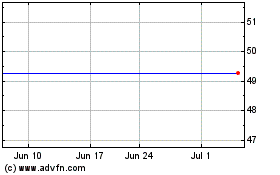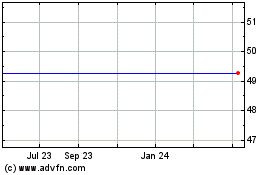The latest big IPO will have to wait.
LoanDepot Inc., a nonbank mortgage lender aiming to sell shares
to the public at a valuation of up to $2.6 billion, postponed its
initial public offering Thursday, citing market conditions, the
company said.
On Thursday, the Dow Jones Industrial Average declined 254.15
points, or 1.4%, and has dropped five of the past seven trading
days, falling 2.3% in that span.
It is the latest chill to the IPO market, especially among
financial-technology companies that bill themselves as the antidote
to big banks viewed as inefficient and insensitive to customer
needs. In recent months, though, investors fretting about the
potential for rising interest rates and increasing stock-market
volatility have become more nervous about sky-high private
valuations that had been attached to many companies with a goal to
go public.
Mobile-payments startup Square Inc. said last week that it would
seek an IPO valuation about 35% below the $6 billion price tag
private investors put on the firm a year ago. Once sought-after
financial technology, or fintech, stocks have also taken a beating.
Shares of LendingClub Corp., which mainly handles consumer loans,
have fallen 11% from their IPO price last December, and shares of
On Deck Capital Inc., which specializes in small-business lending,
have plunged 46% from their December debut. In 2015, the companies'
shares are down 47% and 51%, respectively.
"It's more evidence that the IPO market is one where investors
are in the driver's seat," said Kathleen Smith, principal at
Renaissance Capital LLC, which manages IPO-focused exchange-traded
funds. "The IPOs that have succeeded out have been willing to set
their price very low."
LoanDepot, founded in 2009, is among the largest of a group of
nontraditional lenders that now account for more than four out of
every 10 mortgage dollars borrowed. It wasn't clear if the company
would attempt to price again in the near term or would withdraw
indefinitely.
"LoanDepot has decided to withdraw from pursuing an IPO at this
time due to market conditions," a company spokeswoman said.
Originally, the Foothill Ranch, Calif., company had planned to
sell 30 million shares at a price range of $16 to $18. At $18, the
business would be valued at about $2.6 billion, and the stake of
founder and Chief Executive Anthony Hsieh would be valued at more
than $1 billion.
It isn't the first high-profile IPO to stumble at the finish
line this year, which overall has seen a drop-off in IPO volume and
performance in the U.S. Last month, private-equity-backed grocery
chain Albertsons Cos. halted its IPO on the night it was expected
to raise some $2 billion.
LoanDepot has expanded in just half a decade to be the country's
11th-largest mortgage lender by dollar volume, according to trade
publication Inside Mortgage Finance. Its loan volume swelled by
more than twofold in the past year compared with the prior 12
months, thanks in part to a $38 million acquisition and an
aggressive push in loans ultimately sold to government-backed
entities.
The company, though, has been testing the IPO market as other
new stocks of mortgage lenders and online consumer and business
lenders have performed poorly amid myriad concerns, including
intensifying competition, interest rates and regulation.
In the mortgage business, nontraditional lenders like loanDepot
and Quicken Loans Inc. have taken significant market share.
Large banks such as Bank of America Corp. and J.P. Morgan Chase
& Co. have pulled back from making mortgage loans backed by the
Federal Housing Administration after paying hundreds of millions of
dollars in settlements over improper underwriting with the Justice
Department.
Those loans often involve first-time home buyers or other
financially stretched borrowers.
LoanDepot and its nonbank peers doubled their FHA market share
to more than 60% in early 2015 from less than 30% in 2012,
according to researchers at Harvard University's John F. Kennedy
School of Government.
Overall, mortgage market share for nontraditional lenders,
including loanDepot, more than quadrupled to 42% in 2014 from 10%
in 2009, according to research from Goldman Sachs Group Inc.
Some observers worry the fast growth resembles some parts of the
real-estate boom in the run-up to the financial crisis, when
subprime loans made to borrowers with poor credit fueled the
upswing. The mortgage business is often cyclical, and small
upstarts that aren't bought by large banks can often struggle in
hard times.During the past decade, mortgage lenders such as
Countrywide, IndyMac and Washington Mutual posted years of fast
growth in part due to weaker lending standards, including the use
of products with little or no verification of a borrower's income
or ability to pay.
"It begs the question of whether this is a rewind to the
precrisis period," said Clifford Rossi, a finance professor at the
Robert H. Smith School of Business at the University of Maryland
who previously worked at Citigroup Inc., Washington Mutual and
Countrywide.
Mr. Rossi said there are crucial differences, including
oversight by the Consumer Financial Protection Bureau, an agency
created by the Dodd-Frank financial-overhaul law after the crisis,
and tougher mortgage standards nearly across the board applied by
banks, other lenders and investors.
LoanDepot said in its IPO prospectus that "almost all of our
home loan products require income and asset verification" and
require appraisals in compliance with regulations set forth by the
CFPB.
Still, said Mr. Rossi, "Outside of technology, I don't see that
[nonbank mortgage lenders] have an appreciably new business model
that makes them more sustainable over the long run."
The company initially funds its mortgages mainly with lines of
credit from banks and said it typically holds mortgage loans only
for about 17 days before selling them. In the first half of 2015,
88% of its loans were backed by the U.S. government.
This year, loanDepot also started originating personal loans,
often for consolidating debt. It began making home-equity loans in
September and typically holds those for about 20 days.
LoanDepot is considered part of the alternative lending sector,
and while it uses software to convert leads to potential borrowers,
it doesn't rely as heavily on technology as some fintech companies.
Firms such as LendingClub and Social Finance Inc. find borrowers
almost entirely through online applications or direct mail, while
loanDepot also employs a salesforce to seek out borrowers.
Like other lenders, the company is spending significantly to
build its brand with borrowers. It spent $94 million on marketing
last year, when it booked $544 million in revenue, and $54 million
through the first half of this year.
The company has also spent heavily to acquire
mortgage-originator competitors, shelling out $53.7 million to buy
imortgage in 2013 and $38.2 million to purchase Mortgage Master
this year.
Unlike many startup online lenders, loanDepot is profitable. It
generated $69 million in net income through the first six months of
2015, up from $10 million a year earlier, according to the firm's
regulatory filings. LoanDepot's revenue was $490 million through
June, double what it was in the same period last year.
Parthenon Capital Partners, a private-equity firm that invested
in loanDepot in 2010, was attempting to sell about $65 million of
shares in the IPO. Some of the money raised by loanDepot would have
been used to buy back shares from early investors including
Parthenon and Mr. Hsieh.
Mr. Hsieh wasn't available to comment due to the IPO quiet
period. He launched LoansDirect.com in the 1990s and sold it to
E*Trade Financial Corp. in 2001. He also founded
HomeLoanCenter.com, which merged with LendingTree Inc. in 2004.
Corrie Driebusch contributed to this article.
Write to Telis Demos at telis.demos@wsj.com and Peter Rudegeair
at Peter.Rudegeair@wsj.com
Access Investor Kit for "CitiGroup Inc"
Visit
http://www.companyspotlight.com/partner?cp_code=P479&isin=US1729674242
Subscribe to WSJ: http://online.wsj.com?mod=djnwires
(END) Dow Jones Newswires
November 12, 2015 20:05 ET (01:05 GMT)
Copyright (c) 2015 Dow Jones & Company, Inc.
E TRADE Financial (NASDAQ:ETFC)
Historical Stock Chart
From Mar 2024 to Apr 2024

E TRADE Financial (NASDAQ:ETFC)
Historical Stock Chart
From Apr 2023 to Apr 2024
